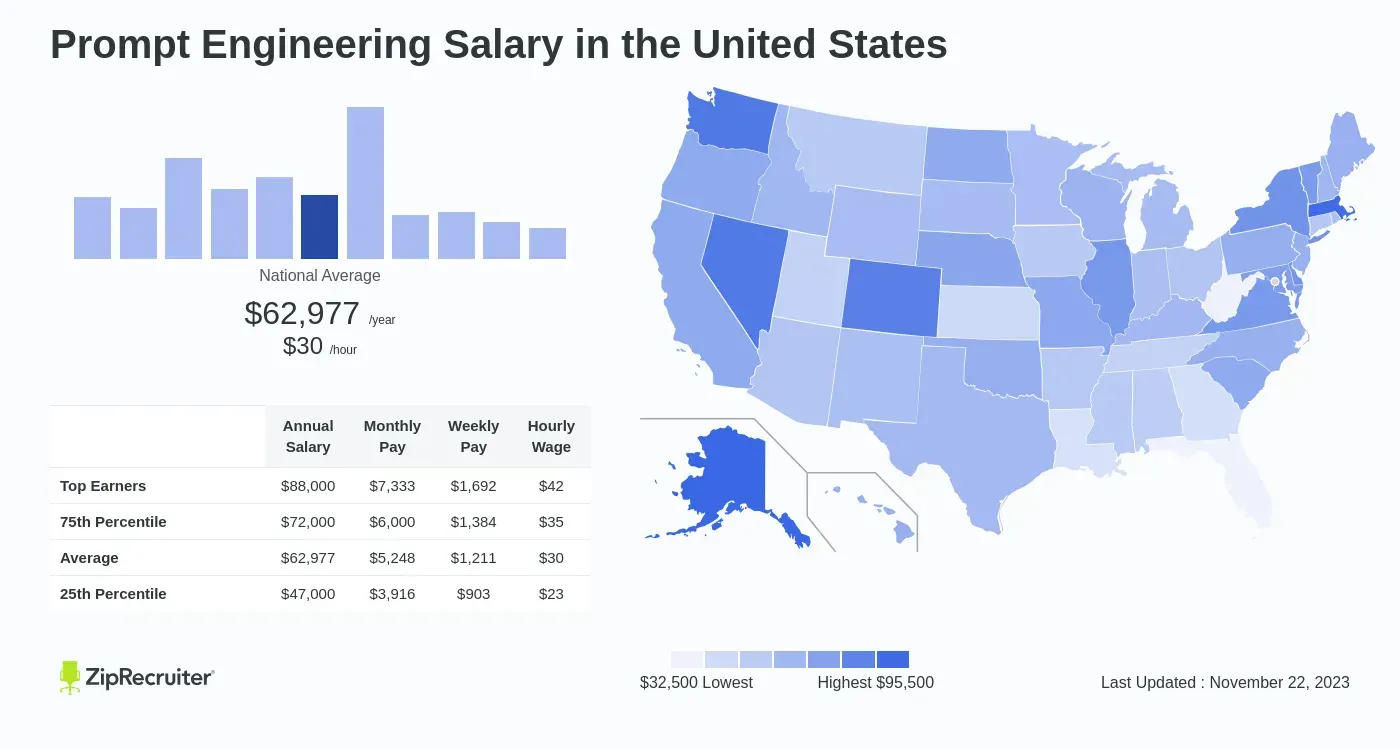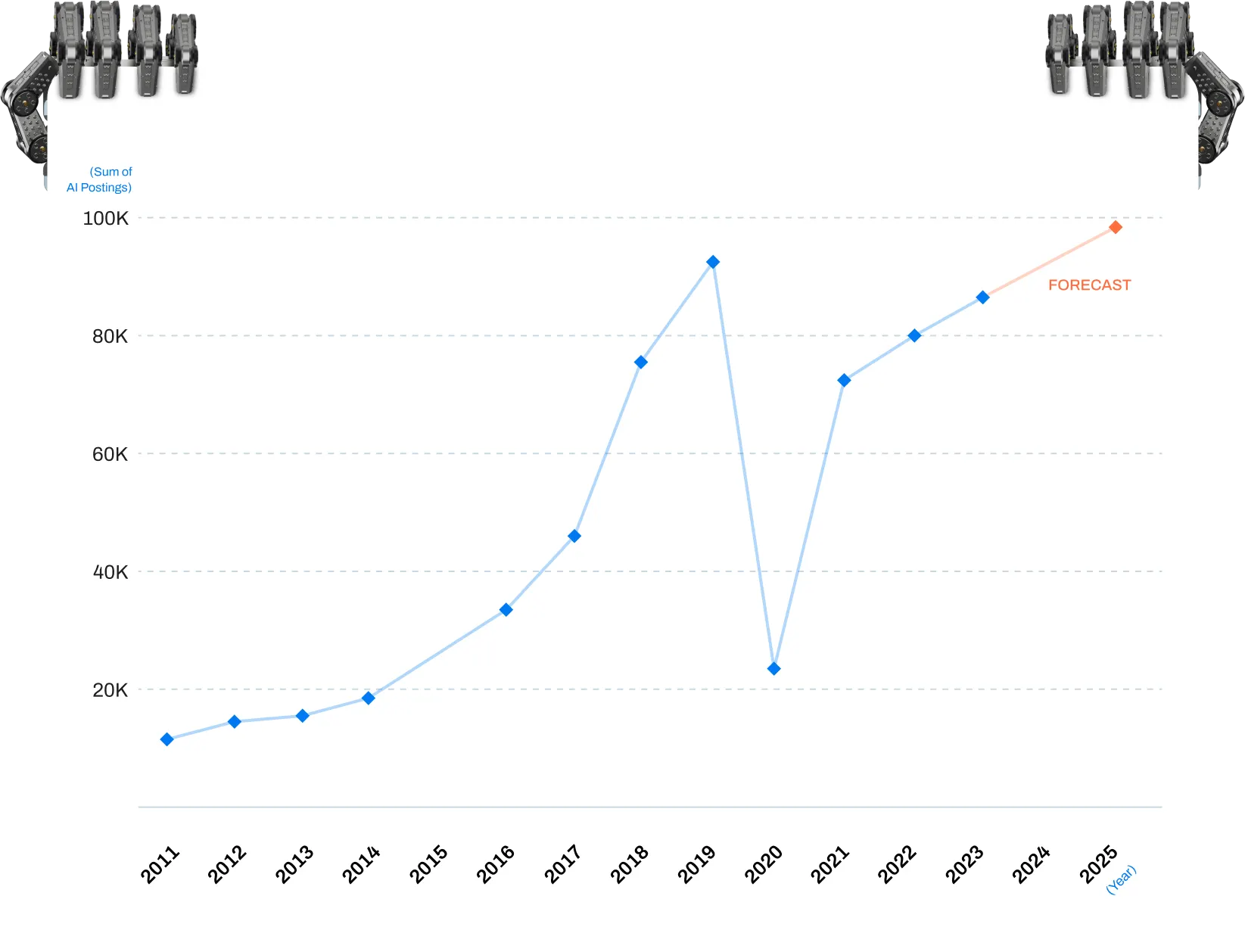In the midst of a booming tech revolution, AI-related jobs are not only becoming more plentiful, but are also offering significantly higher paychecks.
A recent study from Bizreport indicates that AI roles are offering 77.53% higher salaries than other occupations, marking the start of a lucrative era for those equipped with AI skills.
This surge in compensation—documented in "AI Influence on U.S. Workforce Salaries"—isn't confined to seasoned tech gurus. A new role has emerged in digital want ads: prompt engineering, a very profitable job that curiously enough doesn’t require any engineering at all. These positions are attracting salaries up to $449,000 a year, welcoming individuals with just a basic understanding of programming and AI models.
Andrej Karpathy, former Tesla and current OpenAI developer, praised natural communication over programming as the new way to communicate with computers.
“The hottest new programming language is English,” he says in the tweet that’s pinned on his Twitter profile
The hottest new programming language is English
— Andrej Karpathy (@karpathy) January 24, 2023
The financial allure of AI jobs is undeniable. Specifically for prompt engineers, data from a ZipRecruiter report shows an average salary of $62,977 annually in the U.S., with top earners making up to $95,500 per year. The highest paying cities can see prompt engineering salaries up to $80,745, such as in Berkeley, California.
Bizreport says it “gathered data from eight of the most popular job posting platforms in 2023” and then used keyword research to classify and analyze the AI-related job offers. ”In just one year, from 2022 to 2023, computer science salaries in the United States witnessed a substantial surge, with an impressive average increase of 45.87%,” the study concluded.

Things get better at entry level positions, which earn about 128.23% more than their non-AI related counterparts. The gap starts to reduce for jobs that require more experience, with senior roles paying only 48.61% more on average.
At the forefront of this lucrative niche is the art of crafting compelling prompts for AI, recognized by OpenAI CEO Sam Altman as "an amazingly high-leverage skill and an early example of programming in a little bit of natural language."
This sentiment is echoed by individuals like Mark, a technical writer and YouTuber, who shared with Decrypt how profitable it can be to take some time to just sell prompts on the internet. "There are people on their way to making $100,000 this year from selling prompts," he said
But competition in the field has also increased. According to data from LinkedIn, which is owned by OpenAI investor Microsoft, “job posts that mention artificial intelligence or generative AI have seen 17% greater application growth over the past two years than job posts with no such mentions.”
LinkedIn VP of Global Talent Acquisition Erin Scruggs krecommended companies to build a proper AI strategy to “keep up with the market.”
Bizreport's findings support those of LinkedIn.
"We project that by 2024, there will be potentially more than 131,000 AI-related jobs for the computer science market. This substantial number indicates the rapid growth and demand for AI expertise in the job market," the study says.

Unlike traditional coding roles rooted in computer science, prompt engineering is now being targeted to those from non-traditional backgrounds. As Anna Bernstein, a prompt engineer at Copy.ai, told Time Magazine, "I had no tech background whatsoever, but to have a humanities background in this field seems to me like a triumph."
Notably, prompt engineering as a role has also led to the rise of "prompt hacking" by independent prompt engineers which use their knowledge to make AI models go beyond their prescribed limits. From generating nude images or NSFW replies to revealing sensitive information, this can be either funny or dangerously profitable depending on who goes down that road.
So, it's clear that AI may one day automate many (or all) of our jobs, but for now, it's offering some of the most lucrative positions in the workforce. With such impressive pay and accessible entry routes, it seems AI just may be creating better jobs than it's taking away - for now at least. The joke may be on the robots after all.
dited by Ryan Ozawa.

